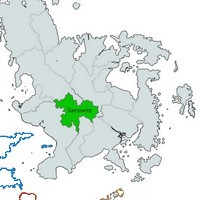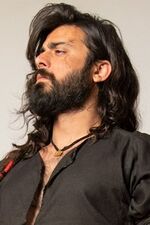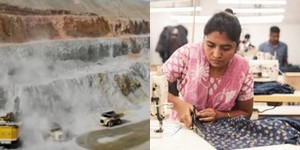Sarnoem
Sarnoem Borderlands | |
|---|---|
|
Flag | |
| Motto: xaeish un yngz (Romanisation) "Courage and knowledge" (Translation) | |
| Anthem: zhalkuth | |
 Sarnoem (green) in Arborea | |
| Capital and largest city | Zhoelunuv |
| Official languages | Griushkoent |
Additional languages | Aellyrian (54%), Arboreaic Dutch (25%), other dialects |
| Ethnic groups | 89% Sarnoeme (including mixed), 11% minorities |
| Religion |
|
| Demonym(s) | Sarnoeme |
| Government | Confederated anarchism |
• Leader | Orzhoer |
| Establishment | |
• Pre Empire | c720 |
• Transition territories | 1600 |
• Modern sovereignty | 1952 |
| Area | |
• Total | 582,464 km2 (224,891 sq mi) |
| Population | |
• 2015 estimate | 51 million |
• Density | 89/km2 (230.5/sq mi) |
| GDP (nominal) | 2015 estimate |
• Total | $8.16 x 1011 |
• Per capita | $16000 (2015) |
| Currency | Luyiath (LYT) |
| Time zone | UTC+8 |
| Date format | DD/SS/YY SY |
| Driving side | left |
| Internet TLD | .sn |
Sarnoem (IPA: /'sarnɯm/) is a landlocked country in the middle of Arborea. Aellyria is located at its west across the Sea of Lights, whereas Castarcia is located east ahead of the international date line across the Sea of Folly. It has a mountainous terrain on its western border and most of the country has a semi-arid climate. Despite being the land of many border changes over many eras, the steadfast usage and preservation of the predominant language of the region made it gain a rich literary tradition, and continues to expand with modern techniques.
The word "Sarnoem" does not mean anything in the native language. Upon the formation of the country in the mid-1900s, the name was chosen to refer to a place in one of its ancient epics, whereby said inhabitants were running from the ruins of a once indestructible kingdom towards the mountains, then waiting and preparing to restore it to its former glory. This passage represents the contemporary ideals of the current nation.
History
Geography
Politics
Unusually classified, Sarnoem features a functioning anarchistic society, but it is sometimes able to appear as an oligarchy when externally interacting with other nations. It also seems to have a non-hierarchial central government, also known as the default government, that stands as a main reference or facilitator, but can be dismissed by the public and is commonly superseded by other equivalent organisations instead. Moreover, a governmental structure can spontaneously form, dissolve soon afterwards, or remain in-flux according to the needs of the circumstance. Similarly, the states in this confederation often have high autonomy regarding how they run themselves.
The leader of the country is called saeth, also translated as king despite having no characteristics as compared to an actual monarch. In an anarchistic country, the leader decides on the main guidelines and provisions for its country. The king also makes decisions on behalf of the entire country regarding international affairs. However, each default department, organisation, community or individual is lawfully allowed to not adhere as they see fit. Incidentally, massive non-compliance is actually rare due to voluntary selection principles.
Orzhoer (IPA: /'ɔrʒɯr/) is the current saeth of Sarnoem. The longer title "Orzhoer saeth" or "Orzhoer king" is never used except for disambiguation. He became saeth in 1295 SY (2015). A few years before that, he graduated with a Masters of Applied Mathematics from Zhoelunuv University. In fact, the decision to tentatively put forth a leader is one of the few times when a democracy-like system is applied in this country's political matters. Candidates, including the current reigning saeth, is contested in each state. Then, the saeth can either accept the results, or decline it and the next best candidate will be the new self-proclaimed saeth. Note that this is also based on a voluntary system, and the public could easily overturn the outcome.
Sarnoem's military is fronted and backed by the Stej Ijzoulke (army), Ynt Ijzoulke (air force) and the Caedz Ijzoulke (navy), though the last one has a far lower amount of units because their only main importance is to patrol the lake border. There are approximately 180000 people in the military, and 76000 more in reserve. Its military expenditure consists of 4.5% of its GDP spending, but as usual in any economics-based calculations for anarchistic models, this is difficult to gauge due to complications as to what counts as transaction involving money. Moreover, it shares the budget with security and emergency services.
Sarnoem usually is not a signatory member of any convention. It is known to violate a few of them. Sometimes, it even follows parts of a treaty when not part of one. Sarnoem shows an air of neutrality as a net result, but upon closer inspection, it is only because there are many independent acting groups, each with their own political affiliations, often with no clear indicator of any major stance, except the obvious one provided by the saeth. Regionally or internationally, it diplomatically maintains tight foreign relations only with those who could truly negotiate through its dissimilar political and economical tendencies.
Economy
The country has a gift economy system. One only uses money or currency when trading externally or in up-tier transactions. The main exports of the country are coats and sugarcane, whereas the main imports are oil and machinery. The mining, manufacturing and textile industries comprise a large sector of the economy. The country is self-sufficient on its energy supply from coal power stations and off-grid sustainability programmes, but blackouts do occur at times when there is a sharp increase in demand for electricity during peak hours. It is estimated that there is a prospective amount of untapped petroleum in the southern region.
Cotton, sugarcane, wheat and tea can be found growing in most parts of the country, whereas berries are farmed in the northeastern highlands. Mineral deposits include chromite, dolomite, coal, peridot, bastnaestite and other ores that are mined and processed in the country. Tourism is less attractive here due to its remoteness and lack of services in rural areas, but it does attract backpackers and hence increase the interest in upkeeping homestays. The largest shopping centre in Sarnoem was built in the southern desert region, and even showcases an indoor snowboarding winter wonderland. Otaegaen, the multinational customisable homeware company, has its headquarters here in Causelsyrtaens. Roeshyng, the fast fashion clothing company, also has several production outlets throughout the whole country.


